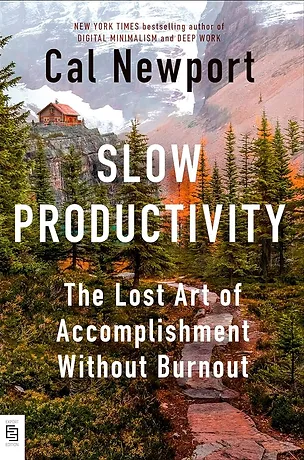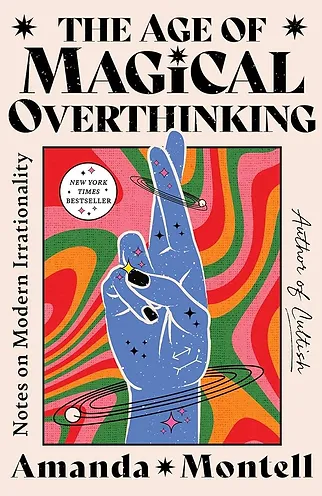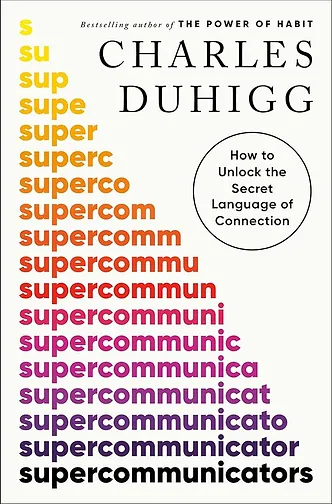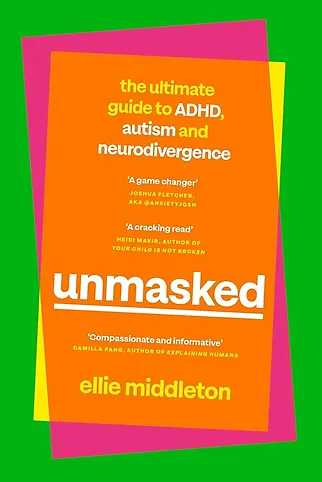
Time to put away the blanket again and replace the tea with a mocktail! Spring is finally here and invites you to stir up the bookworms in the garden soil and plant yourself instead. 😉 That is exactly why we have selected five more books for you, which should not be missing from us this spring. 📚

Of course Do we all want to be more diligent and hard-working, get the most out of every single minute and when you scratch a bit too close to burnout, that's just an expression of our ambitious passion: Hustle Culture, Love It or Leave It. This is not uncommon as a mindset, especially in digitized work bubbles.
A truly inadequate assumption, as Cal Newport now claims: Our social understanding of productivity is fundamentally flawed and must be reformed, away from the idea that busyness means effectiveness. Revise yourself acutely or completely reject your ambitions? These are hardly the only options available to us in our objectives.
“Slow Productivity” is this alternative model and combines three principles at its core to actually achieve significant performance: do less, work at a natural pace and an obsession with quality. It doesn't sound bad, but is that any good? For this purpose, Newport draws on various historical anecdotes from well-known figures such as Galileo, Jane Austen, Isaac Newton and many more.
In some cases, the narratives seem to be instrumentalized for ready-made conclusions, but Newport nonetheless offers an overall successful performance critique accompanied by systemic pragmatism and thus offers an exciting alternative for those who simply cannot identify with the Hustle Culture model but do not want to lose their objectives. Think of ambition in a different way.

In fact, you would think that the 21st century is a high intellectual culture, with a huge range of information, positively influenced by the Internet as possibly the largest encyclopedia of all time and often better educational opportunities than ever before. However, the reality is somewhat different, and “cognitive distortions,” as they are technically known, seem to be increasing despite everything. But how can that be? A question that Amanda Montell has more to offer than just a clever answer.
“The Age of Magical Overthinking” is therefore dedicated to some of the most bizarre peculiarities of the 21st century: Why do we raise celebrities to a morally unreachable pedestal in order to push them off it again — and what does that have to do with the halo effect? Is maintaining a toxic relationship just a social version of the sunk cost fallacy, so can I fix it by investing even more loyalty? Why are so many reacting to Weltschmerz by “manifesting” something better and will I perhaps be able to avert the climate crisis if I learn to pickle my own tomatoes?
The Age of Magical Overthinking not only offers quick-witted and funny cultural criticism, always with the right pinch of humor, but also invites sufficient self-reflection without ever looking down on you. Because anyone who thinks to themselves now: “I don't do that! “Unfortunately, you have to say to him: Yes. 😉
Montell shines in her empathy and hope as part of the ludicrous analyses, which show that somewhere in the cacophony of our mind, there is also a nicer melody playing. A must read in the digital age that has such a significant influence on our thinking — often without us even realizing it.

Is it a bird? Is it an airplane? No, it's the Supercommunicator!
Jokes aside, communication is important. Especially in change projects, we are almost hyper-aware of this. In fact, you don't not can communicate. Food for thought. 😉 In Supercommunicators, Charles Duhigg, — author of The Power of Habit — what it takes to lead conversations to a successful conclusion; how to steer decisions, communicate thoughts competently, disagree without being insulting or simply saying what tips and tricks are needed to navigate the complicated world of conversation.
Duhigg takes us into a divided courtroom, where a juror à la “12 Angry Men” reaches a consensus, accompanies a CIA agent who wins over an unruly spy from abroad and shows how a doctor was able to persuade a vaccine opponent. The most important question is always what it is truly needs to establish a connection with others and why good communication is a superpower in itself. The right read before the next meeting. 😉

Perhaps one of the most unexpected and recent tasks in the digitized working world is creating visibility where entire groups of employees have been normalized away for the longest time. The goal is obvious: Not only to create a more inclusive working environment in which everyone feels comfortable, but can also contribute their unique perspectives. But starting to do this is often easier said than done, as Ellie Middleton also points out.
When we talk about autism and ADHD, more technically speaking neurodivergence, many people have a rough idea, but it usually doesn't go any deeper than that. That's a shame, as we encounter neurotypical people all the time in life without us actually realizing it — whether at school, family, circle of friends and acquaintances, or even at work. That's another reason why making an honest effort to understand neurodivergent people is not a bad idea.
In UNMASKED, Ellie Middleton thus addresses her diagnosis of ADHD and autism at 24 — the moment when the puzzle pieces came together and cultivated her own understanding of not being dysfunctional or broken, but simply neurodivergent; Middleton's brain works differently. And you can understand how this works. 🧠
With a personal narrative, written in piecemeal chapters for whizzing brains like hers, Middleton not only makes an effort to break the stigma surrounding neurodivergence, but also shines with a vulnerable openness and tips for everyday life, on the one hand to navigate a neurotypical world and on the other hand to for everyone to design. A nice introduction to the topic for those who want to strengthen their awareness or perhaps also want to get to know themselves better.

Of course, we don't just want to release you into the upcoming spring with non-fiction books. 😉
What is it about? When a clever, single housekeeper is hired to take care of an outstanding professor of mathematics, it doesn't seem foreseeable that this will establish a life-changing relationship instead of another, slightly annoying nursing job. The professor — intelligent as he may be — suffers from a very unusual problem: Since an accident, his memory lasts less than 20 minutes — and while he gets to know his housekeeper and her son anew every time, the two develop an unusual relationship with the old man, which shows them unexpected poetry in mathematics every day.
A moving story about life in the moment — without ever slipping into kitsch — ties that we make and baseball. Yep, baseball. A quick read recommendation for a lovely sunny afternoon. ☀
As always, we hope you enjoy reading and look forward to talking to you! 📚
Do you have a question or would you like to find out how we can work together?
Feel free to contact us here or via linkedin with us — we'd love to hear from you